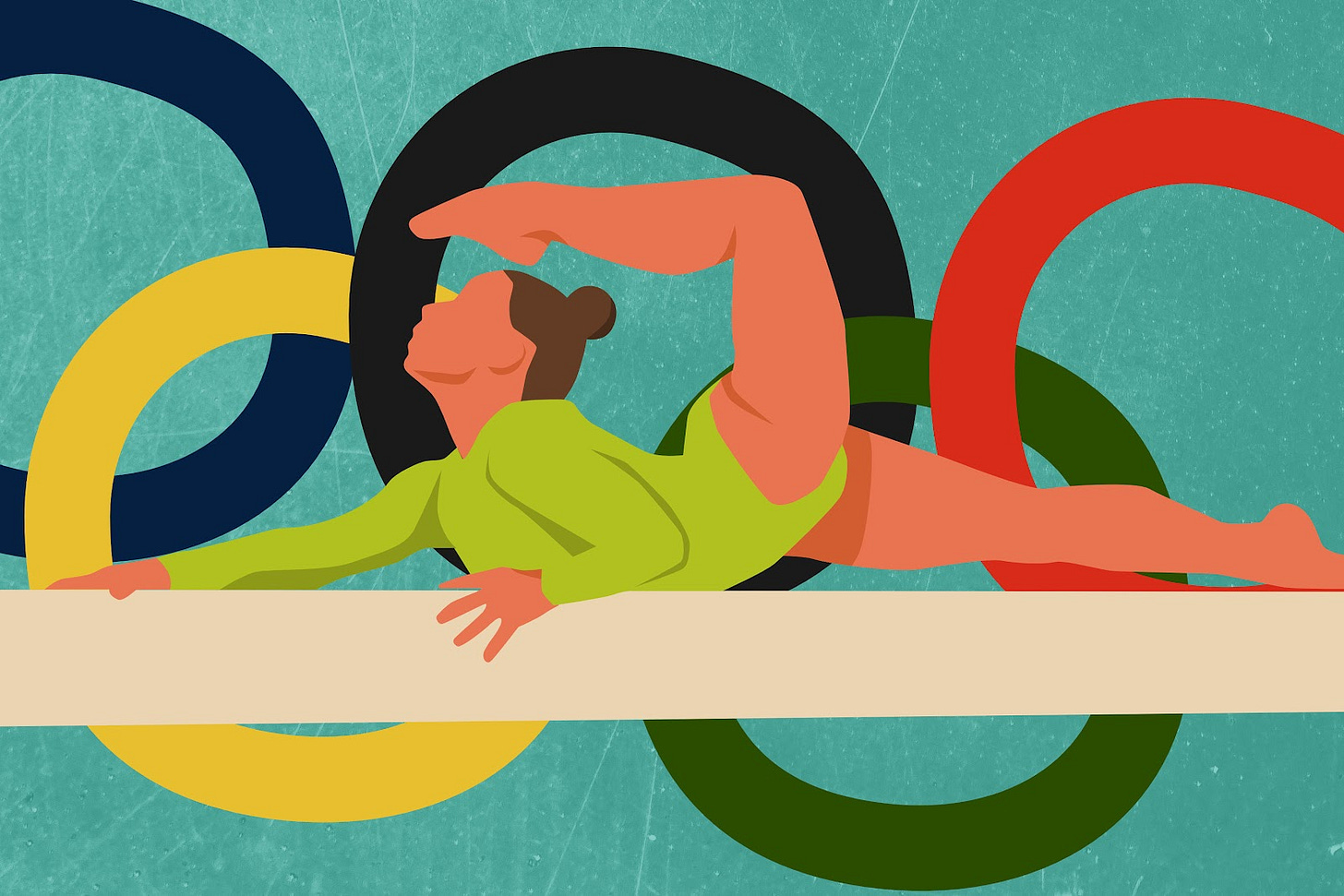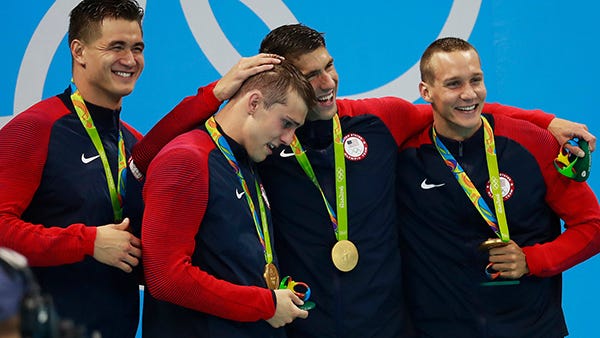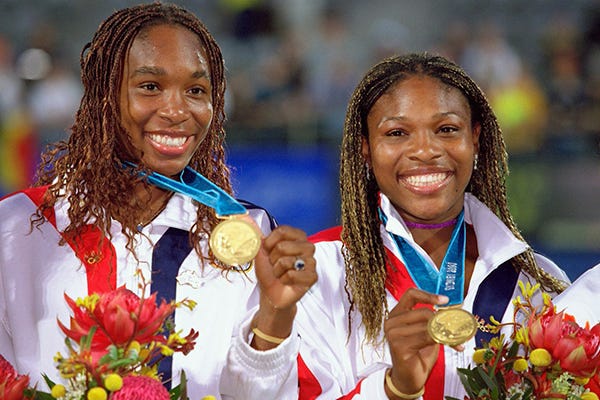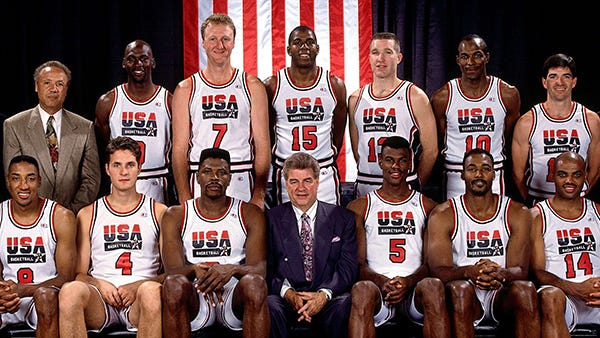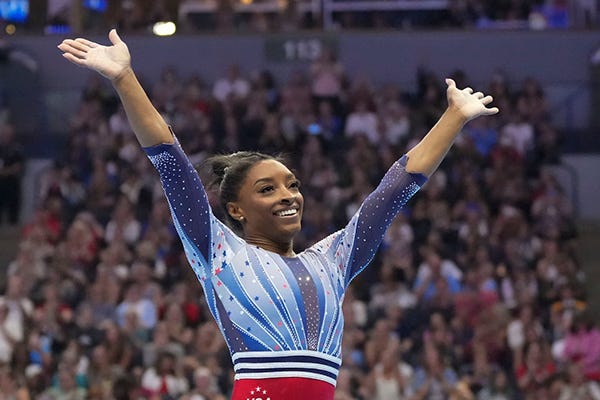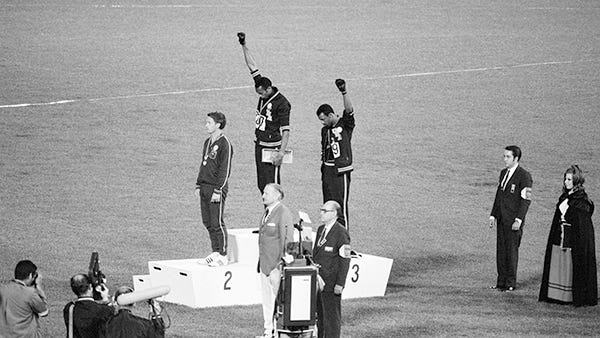Iconic Olympic Moments: Stories of Triumph, Unity, and Inspiration
Unforgettable moments that united viewers of the games
Since international telecasts made watching the Olympics possible in the 1960s, the games have had an uncanny ability to bring viewers around the world together–especially during the most popular sports. For those of us who aren’t athletes, watching individuals with what seem to be superhuman abilities compete with one another, combined with the enormous pressure of the world watching, is the epitome of thrilling entertainment. For most of us, these moments are inspiring and exciting, no matter who we are (and which sports we may or may not watch regularly). We put together some of the most memorable moments and happenings in modern Olympic history that united millions of viewers and fans.
Atlanta, GA 1996: The Magnificent Seven
If you were watching the Atlanta, GA Olympics in 1996, there was no escaping the incredible lore of the women’s U.S. gymnastics team, nicknamed the Magnificent Seven. These seven young women made history in more ways than one. Shannon Miller, Dominique Moceanu, Dominique Dawes, Kerri Strug, Amy Chow, and Jaycie Phelps were led by team captain Amanda Borden. This team was so iconic, it’s almost difficult to pick a defining moment: Shannon Miller went into the games as an Olympic medalist, and was the first American woman to win the gold in balance beam. (Miller is currently tied with Simone Biles for most decorated Olympic gymnast, both with 7 medals, which could change during the 2024 Paris games where Biles is set to compete.) Dominique Moceanu, though not an individual medal winner due to injury and a few mistakes, gained a huge fan base during the games and became the face of the team in many ways. Dominique Dawes won a bronze in floor exercise. But the most iconic moment is probably when Kerri Strug, whose second vault clinched the gold medal for the American team, also resulted in serious injury to her ankle. The photo of her being carried to the podium by her coach Bela Karolyi is one of the most famous Olympic images of all time. Demanding a young athlete compete through injury was heralded in the zeitgeist as brave and rewarding, something Simone Biles would challenge during the 2020 games when she prioritized her health over medals.
Rio de Janeiro 2016: Michael Phelps’ Last Gold Medal
The most decorated medal winner in the history of the Olympics, swimmer Michael Phelps, won his final gold medal in the 2016 games in Rio. He and his teammates, Cody Miller, Nathan Adrian and Ryan Murphy completed the 4x100 meter medley relay, breaking the event’s record with 3 minutes, 27.95 seconds due to Phelps skimming 0.09 off of Aaron Peirsol’s 100 meter backstroke record. Phelps’ last gold medal, won in this final event, brought his overall medal wins across several Olympic games to 28 (23 of them gold). Watching the superhuman Michael Phelps compete in the Olympics between 2000 and 2016 (and win so many medals that we started to lose count) was certainly a thrilling experience, even if you weren’t that into swimming.
Sydney 2000: The Williams Sisters Win Doubles Gold
Venus and Serena barely need a last name; the Williams sisters are two of the most famous tennis athletes of all time. They appeared on the world stage in the late 90s, and quickly became champions and role models. In the 2000 Sydney Olympics, they competed together in tennis doubles–and won gold. But it wouldn’t be their last: the dynamic duo won the same title in 2008 (Beijing) and 2012 (London).
Barcelona 1992: The Dream Team
The 1992 Barcelona games were the first to allow professional athletes when players from the NBA joined the Olympic team to play basketball for the United States. Nicknamed the Dream Team, it is widely considered the best basketball team ever assembled (though some believe the basketball team headed to Paris for the 2024 games might be just as good or better). The players included huge names in professional sports: Michael Jordan, Magic Johnson, Larry Bird, Charles Barkley, Scottie Pippin, Patrick Ewing and more. The players did not stay in the Olympic village with the other athletes, due to security concerns over their celebrity–and the fact that the regular sized beds were not suitable for some of the over-six-feet tall players. The team was undefeated throughout the games, finally winning gold when they beat the Croatian team.
Tokyo 2020: Simone Biles Withdraws
Simone Biles entered the 2020 Olympics in Tokyo already a gold medalist: in the 2016 Rio games, she helped lead her team to gold in the women’s team final, won gold in the coveted all-around title, AND won gold medals in individual vault and floor. This unprecedented performance set an American record for most gold medals in a single Olympic games for women’s gymnastics. In Tokyo, she was the undisputed champion before the games even started, since she was already regarded as one of the best gymnasts in the entire world. This expectation made it all the more devastating when Biles decided to drop out of the team competition after a problematic vault, and went on to withdraw from the individual vault, floor, and all-around competitions, citing mental health reasons. Biles was suffering from “the twisties,” a condition that causes a gymnast to lose awareness midair during a twisting element. While some criticized her for stepping out of competition, others overwhelmingly supported her for prioritizing her mental and physical health, setting an example for other athletes for whom the pressure becomes too much. Biles still holds the record–tied with Olympian Shannon Miller–for most Olympic medals, which could very much change in the 2024 Paris games.
Mexico City 1968: Symbolic Protest
In 1968, race tensions were high in the United States during the Civil Rights movement. At the 1968 games in Mexico City, the men’s 200-meter running event resulted in a big win for the U.S. when African-American athletes Tommie Smith and John Carlos won gold and bronze medals, respectively. During the national anthem played in Smith’s honor as gold medalist, the two raised their fists in the Black Power salute to show solidarity back home with the Civil Rights movement. They also wore badges from the Olympic Project for Human Rights (as did Australian silver medalist Peter Norman), an antiracist advocacy group for civil and human rights for Black athletes in the U.S. and abroad.
Los Angeles 1984: Mary Lou Retton
Mary Lou Retton made history when she became the first American woman to win the gold medal at the women’s all-around competition in gymnastics in the 1984 games in Los Angeles, CA. She also won two silver and two bronze medals in other events. Retton also is responsible for another first: the first female athlete to be featured on a Wheaties cereal box.
We’re looking forward to seeing what happens in the 2024 Olympics to add to this list. What’s your favorite Olympic moment? Tell us in the comments!
Want more? Head over to our Discord where you’ll find tons of other fans there chatting in our forums about the books, TV shows, movies, music, and games we all love! Don’t forget to follow us on Instagram, tumblr, and Spotify for more fandom content—and hit that subscribe button so you never miss a thing at rmrk*st!



